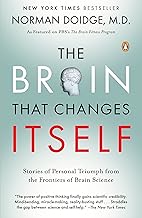
Why We Sleep: Unlocking the Power of Sleep and Dreams
Matthew Walker, Steve West, et al.
4.7 on Amazon
19 HN comments

Thinking, Fast and Slow
Daniel Kahneman, Patrick Egan, et al.
4.6 on Amazon
16 HN comments

The Design of Everyday Things: Revised and Expanded Edition
Don Norman
4.6 on Amazon
15 HN comments

The Body Keeps the Score: Brain, Mind, and Body in the Healing of Trauma
Bessel van der Kolk M.D.
4.8 on Amazon
9 HN comments

The Black Swan: Second Edition: The Impact of the Highly Improbable: With a new section: "On Robustness and Fragility" (Incerto)
Nassim Nicholas Nicholas Taleb
4.5 on Amazon
8 HN comments

The Righteous Mind: Why Good People Are Divided by Politics and Religion
Jonathan Haidt and Gildan Media, LLC
4.6 on Amazon
8 HN comments

The War of Art: Break Through the Blocks and Win Your Inner Creative Battles
Steven Pressfield and Shawn Coyne
4.6 on Amazon
5 HN comments

How to Change Your Mind: What the New Science of Psychedelics Teaches Us About Consciousness, Dying, Addiction, Depression, and Transcendence
Michael Pollan and Penguin Audio
4.7 on Amazon
4 HN comments

The Brain That Changes Itself: Stories of Personal Triumph from the Frontiers of Brain Science
Norman Doidge
4.7 on Amazon
4 HN comments

The Tipping Point: How Little Things Can Make a Big Difference
Malcolm Gladwell and Hachette Audio
4.4 on Amazon
4 HN comments

Maps of Meaning
Jordan B. Peterson and Random House Audio
4.8 on Amazon
3 HN comments

Man's Search for Meaning
Viktor E. Frankl , William J. Winslade, et al.
4.7 on Amazon
3 HN comments

How Emotions Are Made: The Secret Life of the Brain
Lisa Feldman Barrett, Cassandra Campbell, et al.
4.6 on Amazon
3 HN comments

Humankind: A Hopeful History
Rutger Bregman , Erica Moore, et al.
4.7 on Amazon
3 HN comments

Emperor of All Maladies: A Biography of Cancer
Siddhartha Mukherjee
4.8 on Amazon
3 HN comments
anonfornoreasononJune 14, 2021
anonfornoreasononMay 25, 2021
Read “the righteous mind” by Jonathan Haidt. Great audiobook too.
jiscariotonMar 27, 2021
senecaonApr 25, 2021
The Righteous Mind is a good starting place for this topic.
wussboyonJune 25, 2021
jfengelonJuly 20, 2021
I see a fair bit of attempts at understanding. Liberals love to write books like "The Righteous Mind" and "What's The Matter With Kansas?", attempting to understand conservatives from a liberal point of view. I can't think of anything comparable on the right. Progressives seem to me desperate to understand and cater to conservatives, and it feels like the only thing conservatives want is to make my life harder.
It could very well be that I'm just not listening hard enough. That seems to be the response every time liberals lose elections: "understand harder", because the problem is with me. But I'm starting to think that maybe I do understand: they don't want anything from me except someone to be angry at, and whatever despair they're undergoing is more about the deliberate induction of that despair than anything I actually do.
AS37onJuly 28, 2021
> Every time liberals lose elections, there is hand-wringing about understanding the other side. But I've never seen the equivalent worry about how conservatives can understand liberals.
One of the big theories in The Righteous Mind can be used to explain this. The Moral Foundations Theory lists 5 drivers of moral judgments, 5 reasons why people may feel things are 'right'. Then it gives data showing that liberals feel 2 of these strongly and 3 weakly, while conservatives feel all 5 about as equally strongly.
By that theory, the reason that conservatives need not work as hard to understand liberals is that they feel all the same moral impulses liberals do, and more, while liberals only feel 2/5ths of the conservatives' impulses.
The same theory suggests that conservative persuasion will be more effective on liberals than liberal persuasion on conservatives. This then leads to election losses, which leads to hand wringing about how liberals don't understand conservatives, so they can't convince them to vote liberal.
anonfornoreasononJune 15, 2021
Republicans tend (this is not universal) to view things through a lense of six things: faith, patriotism, valor, chastity, law and order. Democrats focus on care and fighting oppression. Again, this is a simplification, but the theme is that conservatives have different moral foundations that make it hard for liberals to understand why they make decisions they do. A solid example (I can't remember if this was used in the book, but it helps me) is "why are they voting against their own interests". I hear this in my personal life all the time! I used to say it! Then I realized that voting for someone who is against welfare, when you are low on the socioeconomic spectrum, makes sense if you overweight faith, and believe that abortion is a grave moral sin. What's some poverty now compared to eternal damnation? I don't believe in hell myself, but this insight let me understand that someone who views things different than me isn't dumb, they just have different values that allow them to rationally decide things that my values seem irrational.
The hard part is trying to talk across this gap in moral reasoning, and find the right balance.